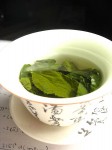More BS for Cancer Patients
Posted June 21, 2009
 I apologize for the recent slow-down in the number of posts. The summer, which one might think offers free time, is actually one of the busiest times of the year for me. There is so much in the news that I cannot possible discuss everything I would like, so I sometimes just throw up my hands. I would like to jump into politics, but science is getting mutilated by the media so much that it is difficult to ignore.
I apologize for the recent slow-down in the number of posts. The summer, which one might think offers free time, is actually one of the busiest times of the year for me. There is so much in the news that I cannot possible discuss everything I would like, so I sometimes just throw up my hands. I would like to jump into politics, but science is getting mutilated by the media so much that it is difficult to ignore.
I overheard a teaser for a local news story this afternoon which suggested that drinking green tea helps to treat prostate cancer. As you might expect, I immediately Googled “green tea and prostate cancer”. The first link was an article on BBC News titled Green tea ’slows prostate cancer’. Why those three words are in single quotes I really do not know. Is there something ambiguous about the phrase?
I expected some stretching of the truth and some wishful thinking, but the article made my jaw drop. It opens with a misinterpretation of the findings of a recent study (McLarty, et al., 2009):
A chemical found in green tea appears to slow the progression of prostate cancer, a study has suggested.
This is a huge stretch given the study’s findings, which I will discuss in a moment.
The next statement is just wrong:
Green tea has been linked to a positive effect on a wide range of conditions, including heart disease, cancer and Alzheimer’s disease.
The most one could say about this statement is that people claim that green tea positively affects these conditions (and I sure hope they meant that it treats those conditions). Although antioxidant research is promising, there is simply no evidence to support the claim that drinking green tea prevents or treats anything other than thirst.
According to the National Cancer Institute research in China suggests that those drinking green tea regularly experience lower rates of certain cancers than those who did not, however, not all risk factors were accounted for and a study in the Netherlands found no such correlation. When literature is contradictory in comparable studies (in terms of quality), parsimony dictates that the null finding is more likely to be true.
The present study involved 26 men (final sample; 6 were removed from analysis for various reasons) with prostate cancer who were asked to take caplets which contained Polyphenon E, an ingredient present in green tea. The daily dose was the equivalent of drinking 12 cups of green tea. After a wide range of time (12 to 214, with 80% between 12 and 53 days), researchers compared levels of several cancer markers to levels prior to treatment and found statistically significant reductions.
The article describes the study fairly accurately, but the implications of the study are discussed as comments by a charity:
A UK charity said the tea might help men manage low-risk tumours.
This is a stretch at best. “Might” is an awfully tentative, weak, difficult to refute word.
This could mean completely avoiding, in some cases, any of the more usual medical interventions and their associated side effects.
??? WHAT??
This kind of statement, set aside in a highlighted quote, is dangerous propaganda. The study’s findings, even if it were well-designed, suggest no such thing, and the quote is taken out of context in the highlighted version. The quote is more accurately given in the body of the article and really says that, if found to be reliable, a link could be included as part of a treatment program of “active surveillance”.
However, the study is terribly flawed and the findings do not support even a correlation between green tea and cancer markers.
The study was an open-label pretest-post test design and the exclusion criteria did NOT include the use of other treatments either prior to or in addition to the study’s treatment. What this means:
- The patients knew what they were taking and probably the hypothesis.
- There was no control group. No counterfactual. Anything related to the treatment — the fact that they received a treatment, attention from researchers, swallowed capsules, drank more water (to swallow the capsules), to name just a few, are possible explanations for differences.
- Any events which occurred between pretest and post test is a possible explanation for differences. Just a few of these confounding variables:
- an existing trend due to treatments received prior to the study treatment
- the knowledge that surgery (proven treatment) is imminent
- pre-surgery instructions
- instructions for improvement of general health
This study’s findings, which were weak if it was a good design, are meaningless. ![]()
McLarty, J., Bigelow, R., Smith, M., Elmajian, D., Ankem, M., & Cardelli, J. (2009). Tea Polyphenols Decrease Serum Levels of Prostate-Specific Antigen, Hepatocyte Growth Factor, and Vascular Endothelial Growth Factor in Prostate Cancer Patients and Inhibit Production of Hepatocyte Growth Factor and Vascular Endothelial Growth Factor In v Cancer Prevention Research DOI: 10.1158/1940-6207.CAPR-08-0167



